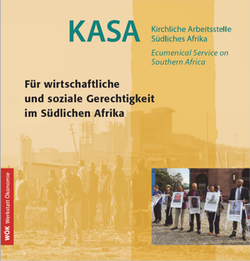KASA in a nutshell
KASA is an information and service centre for Southern Africa as well as a lobbying and campaigning agency, working on issues of social and economic justice in the context of globalisation and climate change.
Founded in 1996 by the Werkstatt Ökonomie, KASA is a project supported cooperatively by ecumenical groups and organisations that had formerly been involved in the anti-apartheid movement.
In the spirit of the Christian preferential option for the em-powerment for the poor, we seek to contribute to the strengthening of civil society and church competence on issues of eco-nomic and social justice in Southern Africa and to accompany our partners in their efforts to work toward it politically and reflect upon it theologically.
Download
KASA offers solidarity
We see ourselves as an interface between groups and organi-sations in Southern Africa and Europe that advocate social and economic justice. KASA opens up spaces to discuss alternatives and to make voices heard that are usually silenced (“Voice & Space”). Our basic principle is to engage with our partners as equals. We incorporate initiatives from Southern Africa into our solidarity work and feed them into the political debate in Europe.
KASA maintains relationships
During our annual visits to Southern Africa, we engage in intensive exchange with partner organisations, civil society groups and social movements. Speaker tours undertaken with our Southern African partners in Germany serve to deepen relationships and enable a lively change of perspective.
Searching for alternatives
Our economic model of production and consumption is reach-ing its limits: recurring food crises, financial and economic crises as well as climate change are all evidence of this. These crises call for global responses and for a fundamental reorien-tation of the way we live and work together. Theological reflec-tion can stimulate important initiatives for global justice, a decent life for all and responsible economic activity.
Such alternative models are often developed and tested at a local or grassroots level, in Southern Africa as elsewhere. Taking note of and supporting these models, making them visible and taking up the new approaches they embody is a fundamental aim of KASA and its partners. At the same time, lobby and advocacy work is needed to intervene wherever these models are endangered by trade or development policy decisions made in the North.
Main countries
The main focus of our work in Southern Africa is currently on South Africa, Zimbabwe, Namibia, Zambia and Swaziland/eSwatini. As a hegemonic power, South Africa is of particular importance. There are points of contact with other countries in the region, especially in relation to the extraction of raw materials, trade, and cooperation within the Southern African Development Community (SADC).
Networking
KASA initiates debates on socio-economic issues in and outside the church and tries to win allies for these efforts at the national and international level in order to pool our strengths. We are member of the Zimbabwe Europe Network (ZEN), of Jubilee Germany, Attac, the German Association of NGOs (VENRO), and the German Human Rights Forum.
KASA's work is process-oriented
For us, economic and social justice are crucial prerequisites for a successful and sustainable process of redistribution and transformation in Southern Africa. The focus of our interest here is on the relationship between Southern Africa and Germany and Europe:
- How do Germany and the European Union influence economic structures in Southern Africa?
- What is the position of the German government concerning debt and debt cancellation for Southern African countries?
- How coherent is development cooperation with the countries of Southern Africa?
- What impact do European Economic Partnership Agreements have on the countries in the region?
- What access do German companies have to raw materials from Southern Africa and who benefits from them?
- Do German companies fulfil their human rights due diligence along their supply chains?
- Who benefits from Fair Trade and how could it generate more positive effects, not least for farm workers?
- How can the issue of unjust distribution of land be resolved in the interests of marginalised rural populations?
Lobbying and advocacy
Our political advocacy work is based on vibrant relationships with partner organisations and grassroot movements in Southern Africa. We take up their concerns and translate them into demands directed at politicians and companies. Our lobbying work is strengthened by networking and supported by targeted campaigns. We seek to engage in effective means of action that also take into account the complexity of political contexts.
Campaigning
Taking specific challenges as our starting point, KASA highlights publicly the negative impacts on people in Southern Africa gen-erated by government policies and corporate activities.
With regard to international trade, we mobilise voices for a fair trade policy that provide critical commentary on the negotiations over free trade agreements between the European Union and African countries. And with our “Plough back the fruits” campaign we are currently calling on companies involved in platinum mining, processing and trading to comply with human rights due diligence obligations along the supply chain.
Education and awareness raising
KASA supports German church groups and organisations work-ing on Southern Africa by providing information, elucidating background contexts and facilitating contacts. This includes providing advice for community and school partnerships, work-ing with school classes and confirmation groups as well as giving a broad range of lectures and seminars, some held in cooperation with adult education institutions. We are currently focusing on improving the quality of school partnerships with Southern Africa and offering inputs for global learning programmes.
Research and information
With our periodical newsletter, the compilation of background information on our website and the publication of journal articles, KASA attempts to raise awareness among the broader public of the issues it addresses and to initiate discussions based on properly researched information. This, alongside our educational and campaign work, forms the basis of our advocacy and lobby work.

